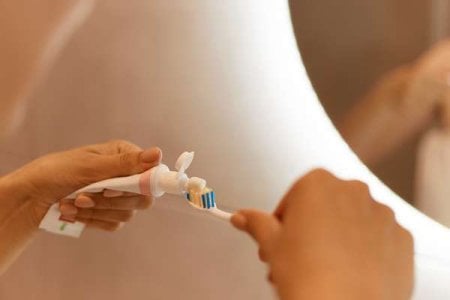Is whitening toothpaste damaging your teeth? Doctor weighs in
Our smiles often reflect the life we've lived, and it's natural to want to keep them looking their best.
Whitening toothpaste has become a popular choice for those seeking a brighter smile without the expense of professional treatments.
However, a recent surge in complaints has raised concerns about the safety of some over-the-counter whitening products.
A woman from Adelaide named Hannah Palmer shared an experience that has struck a chord with many Australians.
After a routine visit to the dentist, she was shocked to learn that her enamel was severely damaged.
She quickly attributed this damage to her use of a particular whitening toothpaste.
'This is your sign, throw out that purple toothpaste whitening s***,' she stated.
'I just went to the dentist, and apparently, I've got next to no enamel on my teeth left because I’ve been using it,’ Palmer revealed.
Her story quickly resonated with hundreds who shared their dental woes, from toothaches to unexpected cavities, all seemingly linked to their use of various whitening toothpaste brands.
While some pointed fingers at HiSmile, others mentioned issues with Colgate products.
‘Did it give anyone else mouth ulcers? I’ve never had those before until HiSmile,’ a commenter claimed.
‘The Colgate purple one did the same to me! My teeth are so sensitive, and whenever I eat anything sweet now, I’m in so much pain,’ another shared.
The debate has been fierce, with some defending the products and suggesting that misuse, rather than the products themselves, is to blame.
'It’s not toothpaste. You aren't supposed to use it every day, it’s just whitening paste. Still gotta brush your teeth,' one user argued.
To shed light on the issue, Dr Fadi Yassmin, a spokesperson for the Australian Dental Association (ADA), explained that the composition of whitening toothpaste often includes a small amount of peroxide and abrasive elements designed to remove stains.
However, he cautioned that excessive use could indeed erode enamel.
'If used more excessively, you're likely to take away the enamel,' he stated.
He added: ‘You could find some patients that are using these products are quite keen to get their teeth whitened so end up using too much of it—so it's not the product per se sometimes, just overzealous brushing.’
Dr Yassmin also emphasised the importance of addressing any underlying dental issues, such as sensitivity or gingivitis, before considering cosmetic procedures like whitening.
'Any sort of aesthetic or any cosmetic procedure needs to be [done] amongst healthy, inflammation-free gums,' he advised.
For those considering whitening products, Dr. Yassmin recommended using those approved by a dentist, which have undergone rigorous testing, unlike many over-the-counter options.
'A lot of over-the-counter [whitening products] aren't usually tested, so they sort of pass under the radar,' he warned.
ADA has called for better regulation of dental treatments sold directly to consumers, including whitening kits.
The lack of stringent testing for these products poses a risk to the public, and the ADA believes that legislation should be strengthened to protect consumers from its potential dangers.
If you're considering whitening your teeth, it's crucial to consult with your dentist first. They can assess the condition of your mouth and recommend safe and effective options.
Pursuing a pearly white smile should never come at the cost of your dental health.
If you've experienced any adverse effects from whitening toothpaste or have concerns about your dental care routine, don't hesitate to contact your dentist for professional advice.

Do you have a story or experience with whitening toothpaste that you'd like to share? Let us know in the comments below!
Whitening toothpaste has become a popular choice for those seeking a brighter smile without the expense of professional treatments.
However, a recent surge in complaints has raised concerns about the safety of some over-the-counter whitening products.
A woman from Adelaide named Hannah Palmer shared an experience that has struck a chord with many Australians.
After a routine visit to the dentist, she was shocked to learn that her enamel was severely damaged.
She quickly attributed this damage to her use of a particular whitening toothpaste.
'This is your sign, throw out that purple toothpaste whitening s***,' she stated.
'I just went to the dentist, and apparently, I've got next to no enamel on my teeth left because I’ve been using it,’ Palmer revealed.
Her story quickly resonated with hundreds who shared their dental woes, from toothaches to unexpected cavities, all seemingly linked to their use of various whitening toothpaste brands.
While some pointed fingers at HiSmile, others mentioned issues with Colgate products.
‘Did it give anyone else mouth ulcers? I’ve never had those before until HiSmile,’ a commenter claimed.
‘The Colgate purple one did the same to me! My teeth are so sensitive, and whenever I eat anything sweet now, I’m in so much pain,’ another shared.
The debate has been fierce, with some defending the products and suggesting that misuse, rather than the products themselves, is to blame.
'It’s not toothpaste. You aren't supposed to use it every day, it’s just whitening paste. Still gotta brush your teeth,' one user argued.
To shed light on the issue, Dr Fadi Yassmin, a spokesperson for the Australian Dental Association (ADA), explained that the composition of whitening toothpaste often includes a small amount of peroxide and abrasive elements designed to remove stains.
However, he cautioned that excessive use could indeed erode enamel.
'If used more excessively, you're likely to take away the enamel,' he stated.
He added: ‘You could find some patients that are using these products are quite keen to get their teeth whitened so end up using too much of it—so it's not the product per se sometimes, just overzealous brushing.’
Dr Yassmin also emphasised the importance of addressing any underlying dental issues, such as sensitivity or gingivitis, before considering cosmetic procedures like whitening.
'Any sort of aesthetic or any cosmetic procedure needs to be [done] amongst healthy, inflammation-free gums,' he advised.
For those considering whitening products, Dr. Yassmin recommended using those approved by a dentist, which have undergone rigorous testing, unlike many over-the-counter options.
'A lot of over-the-counter [whitening products] aren't usually tested, so they sort of pass under the radar,' he warned.
ADA has called for better regulation of dental treatments sold directly to consumers, including whitening kits.
The lack of stringent testing for these products poses a risk to the public, and the ADA believes that legislation should be strengthened to protect consumers from its potential dangers.
If you're considering whitening your teeth, it's crucial to consult with your dentist first. They can assess the condition of your mouth and recommend safe and effective options.
Pursuing a pearly white smile should never come at the cost of your dental health.
If you've experienced any adverse effects from whitening toothpaste or have concerns about your dental care routine, don't hesitate to contact your dentist for professional advice.
Key Takeaways
- A woman from Adelaide named Hannah Palmer raised concerns about enamel damage from using over-the-counter purple whitening toothpaste.
- Many individuals responded with their stories of toothaches and dental problems after using whitening products, sparking a backlash against brands like HiSmile and Colgate.
- Australian Dental Association (ADA) spokesperson Dr Fadi Yassmin explained that excessive use of whitening toothpaste can erode enamel due to its abrasive qualities and peroxide content.
- The ADA advocates for stricter regulation of at-home dental treatments to protect consumers from potential risks associated with DIY dentistry.
Last edited:








